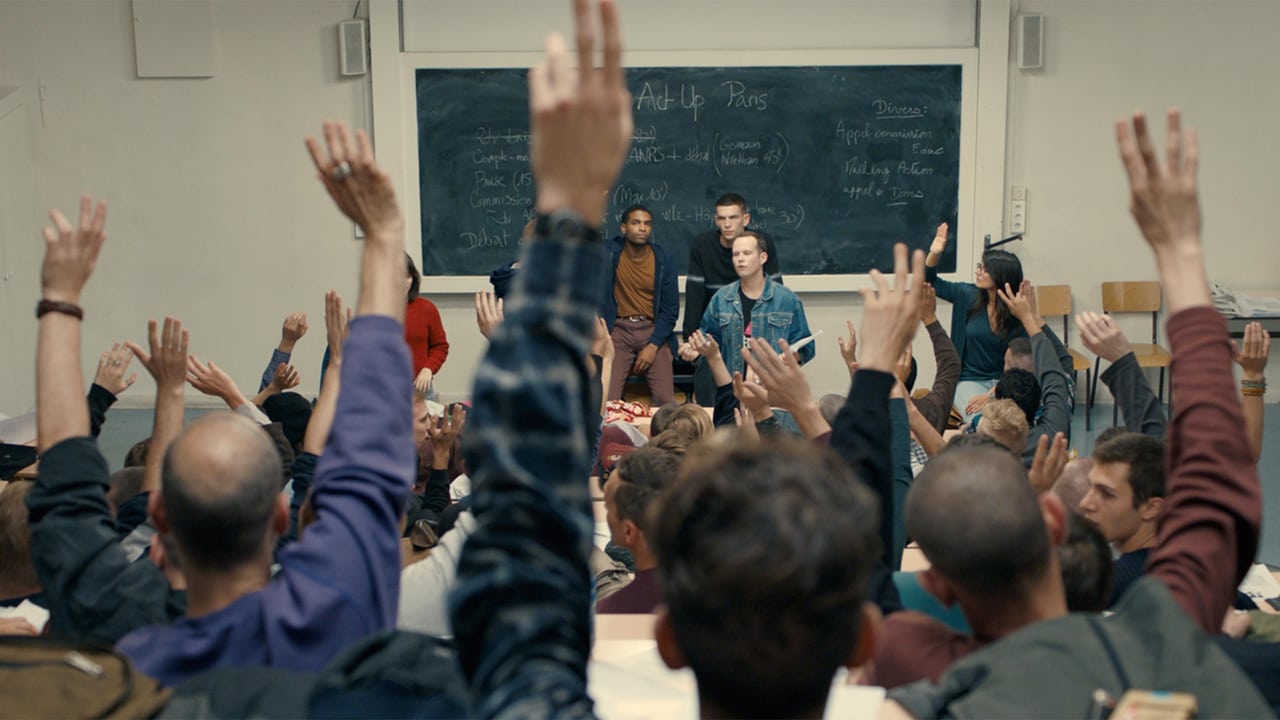Skunkyrate
Gripping story with well-crafted characters
AnhartLinkin
This story has more twists and turns than a second-rate soap opera.
ActuallyGlimmer
The best films of this genre always show a path and provide a takeaway for being a better person.
Abegail Noëlle
While it is a pity that the story wasn't told with more visual finesse, this is trivial compared to our real-world problems. It takes a good movie to put that into perspective.
lasttimeisaw
Drawing on his and his co-writer Philippe Mangeot's personal experiences, French queer filmmaker Robin Campillo's third feature BPM (BEATS PER MINUTE) vehemently re-enacts the activism of ACT UP (AIDS Coalition to Unleash Power) group's Paris branch in the early 90s during the hiking AIDS pandemic. As a César awards' BEST FILM recipient, BPM emanates immersive intimacy that foremost registers the immediacy of status quo, whether it is their hands-on non-violent protests on various occasions aiming at the government's inaction and apathy, the pharmaceutical corporate's sloth and cupidity in the form of immoral hunger marketing, or, predominantly, during their convocations where members contend, dispute and express their ideas and methods in a diplomatic fashion, met with either approving finger-snapping or plain hissing. Campillo's method is unpretentiously engaging with his fly-on-the-wall lens, allots munificent time to studiously record the sparks-flying meetings and tries to reach as many individual's voices as possible, even sometimes it feels erring on the side of repetition because their situation is pretty dire while their adversity has no conscience to repent. Moreover, Campillo doesn't whitewash the internecine ill-will that inherently lives and breathes inside any sort of human congregation, best incarnated by the ambivalent relation between our protagonist Sean (Biscayart) and the group leader Thibault (Reinartz). That tactile intimacy also flows in the veins of the central romance between Sean and Nathan (Valois), and it is the latter's novice perspective that serves as the guidance of leading audience into a terra incognita in the first place. Their interaction runs tellingly from full-on sexual congress that defies fear and embraces love, to their tête-à-têtes shedding lights on their respective past, until the later stage when Sean's vitality begins to be overtaken by the virus, where a sense of tacit understanding holds out during his last days (including one last lurid orgasm on his hospital bed). The crunch to eventually put Sean out of misery which Nathan executes with superb efficiency on top of smoldered anguish, chimes in brilliantly with Campillo's clinically perceptive take on the concomitant aftermath of Sean's demise, repressed grief, wistful relief and an insidious dread that haunts the rest "pozs", a soul-eating hopelessness becomes a sign of the times for queer community. On the less graver front, Campillo ascertains that mood is high in daylight Gay Pride marches and vibes are sensuous in fluorescent abandon on the dance floor, striking visual flourishes include a nightspot Tyndall effect being glisteningly transformed into a virulent aggression and a blood-soaked Seine imagined by a deteriorating Sean, as his silent last cri de coeur. Performance-wise, Campillo marshals a cracking, preponderantly youthful cast that exudes passion and spontaneity, besides his usual vim-and-vigor, the Argentina-born Nahuel Pérez Biscayart is tasked with a grueling body-emaciation which he rounds off summa cum laude, a daunting transmogrification futher underlined by the diminished color in his bulging eyes; newcomer Arnaud Valois, counterbalances Biscayart with dignified aplomb and quietening restraint that immediately distinguishes him from rest of the stigmatized activists; both Antoine Reinartz and Adèle Haenel (who plays the avid lesbian activist Sophie), pull their backs into the heady contestation with zest and artistry, plus the former makes a good fist of showing the elusive complexity burdened by a leader figure. Encompassing and melding the tripartite elements of queerness, politics and mortality, BPM is an intrepid critique that covers warts and all of a pyrrhic fight in its darkest years.
Jeanne Francoise
Dear movie freaks, yesterday I went to film festival and I choose to watch this movie because of a reason: I already brainwash by Hollywood, so I want to watch other movie. This one is coming from France. As far as I know about French movies, they are sarcastic, well-presented, full of sex scenes, and shows the reality or humanity of marginalized people, and sometimes have clear ending. This movie 120 BPM has contributed to value up French movies this year and I do not so surprised if this movie was appreciated in Festival de Cannes. 120 BPM is a movie about the movement to prevent AIDS in the early 1980s in France, where at that time condoms were uncommon, despite of free-sex society. The scenes, cinematography, and main story about this movie is quite simple, but sharp in giving meaning, so that in each take, they have grammar of the scene and I could imagine they had shooting in many angles, as this movie could represent AIDS prevention in every angle of the story. Just like other French movies, this movie has sex scenes and hard language, so that if there are teenagers with you, I suggest you to explain more. The Director here also gives some real footages of the movement, so audience could have mental image of what was going on at that time, especially from the sad scenes, audience will remember the whole story as the critic for French government at that time (the President was Francois Mitterand, from French Socialist Party). Quite different from Brave Heart, this movie also wanted to say the AIDS prevention movement is for everyone, not for leftist people and I think this clear idea that had been founded the acting of all actors of this movie, deserve a high acclaim from many film festivals, including film festivals in Indonesia, my hometown. Thank you for 100% Manusia, an Indonesian NGO, who deliver this movie to our eyes.
robfwalter
This movie is not perfect, but its flaws are outshone by its facets. The most sparkling among those is Arnaud Valois, who is smoking hot as Nathan, one of the ACT UP campaigners who this film follows. Good acting, a warm heart and a realism that is hard to find in big idea movies are also highlights of this film. Yes, an awful lot of it takes place in meetings in a lecture theatre, but these scenes actually had my heart racing, so true were they to the reality of activist politics - trying to decide if you should speak up or let a point pass, understanding both sides of an argument but knowing that the purpose of a meeting is to make a choice, hating someone's ideology but trying to maintain a working relationship with them. In this way, the movie finds its relevance to today. If politics is to be taken back from careerists and corporations to instead deal with real problems such as climate change and growing income and wealth inequality, it will require everyday people to take their cue from 120 Battements Par Minute and turn up to meetings, argue points of order and collectively decide how to act.The two main shortcomings of the film are its earnestness and its length. Even just cutting fifteen minutes from it could have made the film easier to take, and there is probably half an hour that could have gone. In some ways it's stuck trying to tell a Hollywood story at a European pace, and as a consequence it does drag at times.I was prepared for the earnestness, as I had seen the previews, but there are still a few times when it felt more like instruction than entertainment. However, there are also moments of levity and it's worth giving up an extra half hour of your time to see a film that is as profound, important and relevant as this one.
Richard Burin
An intelligent yet visceral film about the gay community in '80s Paris, which starts brilliantly – focusing on the protests and meetings of Act Up, a group of guerrilla AIDS activists – before turning into a film about a man dying of the illness.No matter how compassionately, credibly and intimately it does that, segueing from a film about ideas to one about the individual, contrasting the character's dynamism and beauty with his pain- ravaged impotence, and showing the body – not the city – as the battleground, it's ground we've covered countless times before, and (at the risk of sounding awful) it made the movie increasingly tedious.At its best, this confrontational, unsentimental but humanistic film has unexpected echoes of Melville's Army in the Shadows, which looked at action, division and necessity within the French Resistance, and I understand why it included so many sequences of illness and sex, but those elements don't seem as interesting as the story it started to tell. When it returns to it in those final moments, loaded with the suffering and sadness of what's gone before, the results are admittedly astounding.Nahuel Pérez Biscayart is absolutely terrific as Sean, a founding member, Mesut Őzil-alike and all-round complex human being, first introduced to us justifying the fact that he and his mates have handcuffed a government official to a post during his team's PowerPoint presentation.

